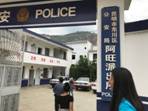People
Since one does not know what person or information can be meaningful, it’s useful to pursue multiple angles simultaneously. It is important to recognize that each person you encounter may have a vested interest in concealing certain facts of the story. It is key to a successful search to think through the question, “How might this benefit this person by keeping to the official story. Take in any and all information gathered from people with a keen and skeptical eye, and remain willing to dig further. Below is a starter list of people that are often most pivotal in searching.
 Guide – Make sure you have a guide/translator who is supportive of what you are trying to accomplish. It is suggested to have a discussion about the fact that you are not the “typical” tourist, and would like to not only visit these specific spots you’ve identified, but also you would like to have everything translated that is said. It is recommended to bring copies of original documents and have guide be able to view written characters. Be earnest and share that you are not interested in only the “official information, but simply want to find out what is the real story. In other words, let him/her know you can “handle the truth”, whatever it is and wherever it leads. Simply share who you are and your desire to know the real facts and why.
Guide – Make sure you have a guide/translator who is supportive of what you are trying to accomplish. It is suggested to have a discussion about the fact that you are not the “typical” tourist, and would like to not only visit these specific spots you’ve identified, but also you would like to have everything translated that is said. It is recommended to bring copies of original documents and have guide be able to view written characters. Be earnest and share that you are not interested in only the “official information, but simply want to find out what is the real story. In other words, let him/her know you can “handle the truth”, whatever it is and wherever it leads. Simply share who you are and your desire to know the real facts and why.
 Orphanage Director/ Staff -Typically it is best to not let any staff know you are searching at all. If you even mention interest in talking to the finder, it is likely the director will call the finder and “coach” that person to stay to original paperwork story. If any information is false, they have huge interest in maintaining façade of the “official story”. So, any searching one does in China, is usually best done without the knowledge of the director. It has happened that a nanny or other staff member has direct knowledge of a child’s birth family. If you have a reasonable idea that this may be the case, it is critical to arrange a private meeting with that person to pursue conversation with the individual.
Orphanage Director/ Staff -Typically it is best to not let any staff know you are searching at all. If you even mention interest in talking to the finder, it is likely the director will call the finder and “coach” that person to stay to original paperwork story. If any information is false, they have huge interest in maintaining façade of the “official story”. So, any searching one does in China, is usually best done without the knowledge of the director. It has happened that a nanny or other staff member has direct knowledge of a child’s birth family. If you have a reasonable idea that this may be the case, it is critical to arrange a private meeting with that person to pursue conversation with the individual.
 Foster families sometimes possess information on the birth family, but will not speak until a relationship is builtand trust is clearly established. Foster families don’t typically speak much in front of orphanage officials, if at all. Orphanage directors typically discourage or sometimes outright “forbid” contact between foster and adoptive families. It’s best to arrange a completely private meeting with the foster family and on the foster family’s “turf” so that things are comfortable for them. If you have the contact information prior to arriving in country, it is best to build up relationships over a period of several years and establish a long and strong connection. Don't forget that you are building relationships! That is the way things work in China.
Foster families sometimes possess information on the birth family, but will not speak until a relationship is builtand trust is clearly established. Foster families don’t typically speak much in front of orphanage officials, if at all. Orphanage directors typically discourage or sometimes outright “forbid” contact between foster and adoptive families. It’s best to arrange a completely private meeting with the foster family and on the foster family’s “turf” so that things are comfortable for them. If you have the contact information prior to arriving in country, it is best to build up relationships over a period of several years and establish a long and strong connection. Don't forget that you are building relationships! That is the way things work in China.
“Finder” – this person is commonly the most pivotal person in the search process. Your guide will be an important intermediary here in making potential contact with a finder. It is best to prepare a list of questions while at home and you have the time to carefully and thoughtfully prepare a full list of questions you wish to explore.
- Hospital workers – if they agree to search any records, they will often ask for written authorization which looks “official”. This can be produced, sometimes with some notarial certificates that your guide can assist you in finding a local notary. Generally people either like to have it totally unofficial or, else have an official document with lots of stamps and seals to “cover themselves” if they are questioned. Generally, the ordinary Chinese citizen is quite sympathetic and intrigued with an adoptee or adoptive family conducting a birth family search.
- Police person –This usefulness of this contact varies greatly. Usually this person does not have much additional information, but there have been cases in
 which the police officer actively helps lead the search and has done so successfully. The moral of the story is that one never knows where assistance will come from. Even if this person has no insight or specific assistance, oftentimes it is warm reception for the adoptee themselves. At times, an officer will share details such as how long the child spent at the police station, who else the child encountered; or the police person may have taken the child to the hospital for care, or directly to the orphanage. It is generally worthwhile to explore any details from the police report and “chase down” any new informational trails which may come from this. At times, the police person is simply gratified to know what has happened to the child, and is often excited to make that personal connection. The police person may also be able to confirm information shared by the finder, or fill in gaps if the finder cannot be located. One should allow adequate time in the city where the child was found to fully any of these people connections and explore various aspects.
which the police officer actively helps lead the search and has done so successfully. The moral of the story is that one never knows where assistance will come from. Even if this person has no insight or specific assistance, oftentimes it is warm reception for the adoptee themselves. At times, an officer will share details such as how long the child spent at the police station, who else the child encountered; or the police person may have taken the child to the hospital for care, or directly to the orphanage. It is generally worthwhile to explore any details from the police report and “chase down” any new informational trails which may come from this. At times, the police person is simply gratified to know what has happened to the child, and is often excited to make that personal connection. The police person may also be able to confirm information shared by the finder, or fill in gaps if the finder cannot be located. One should allow adequate time in the city where the child was found to fully any of these people connections and explore various aspects.





